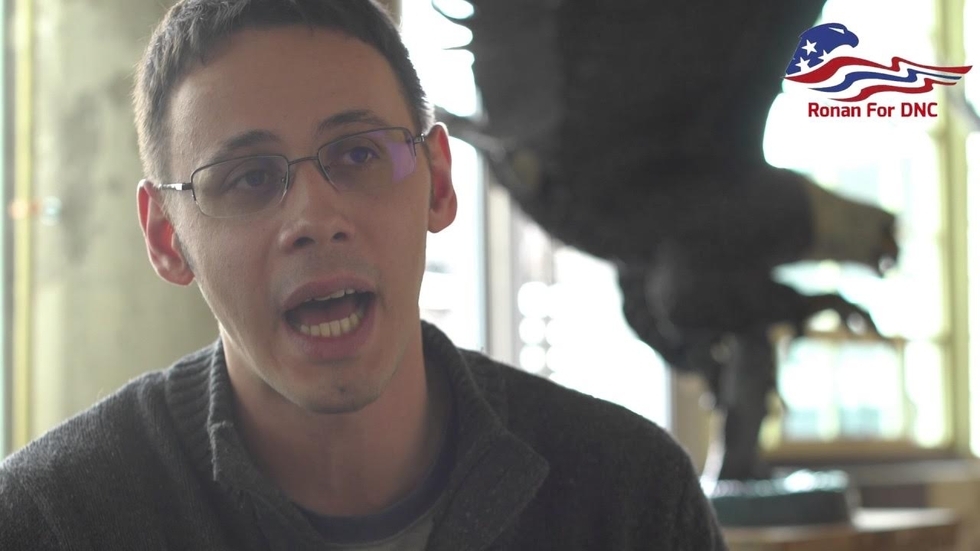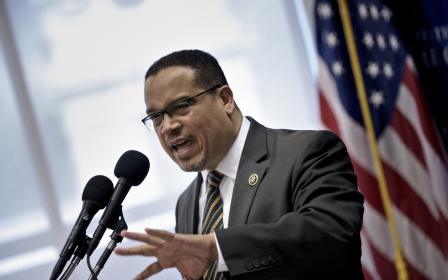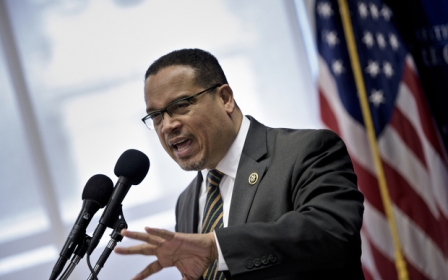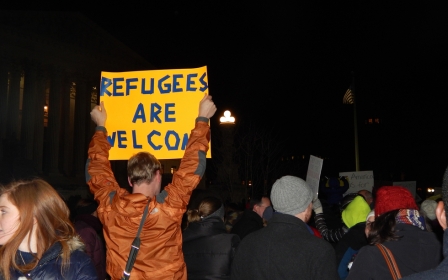Iranian-American launches vision to push Democratic party to the left

NEW YORK, United States – The Democratic National Committee (DNC) will vote for a new leader this weekend. The contest’s frontrunners personify the battle over the party’s future: establishment liberal values embodied by former labor secretary Tim Perez, a favourite of the Clintons and former president Barack Obama, and progressivism in the style of Vermont Senator Bernie Sanders and Minnesota Congressman Keith Ellison.
But they aren’t the only contenders. This race for DNC chair this year is one of the most contested in history. Middle East Eye spoke to long-shot candidate Samuel Ronan, a 27-year-old US air force veteran and Iranian-American who is running from the left of Ellison, about his vision for the future of the Democratic party.
You can’t do it by ‘dropping bombs’
“If we really want to change the Democratic party, we have to put the power back in the hands of the people,” Ronan told MEE.
The DNC has about 447 members. They are comprised of state-elected members, state Democratic party chairs and vice-chairs (typically the highest-ranking member of the opposite sex of the chair), and a number of “representative” Democratic officials who hold elected office, according to the DNC website. They will choose the new chair on 25 February, behind closed doors.
If Ronan had it his way, the entire process would be democratic.
Ronan’s platform mirrors that of the Justice Democrats, a new progressive movement started by The Young Turks' Cenk Uygur, after the surprise victory of Donald Trump, that pledges to not receive donations from billionaires or corporate financiers in favour of grassroots fundraising. He believes it is up to Democrats to restore the US public’s trust in the party.
In Ronan’s view, the trust deficit comes not only from corporate donations and anti-labour decisions, but also US interventionism. As a veteran, he said he doesn’t see the point in fighting wars that can’t be won.
When asked about Trump’s recent pivot on the decades-old US policy of a two-state solution to the Israeli occupation of Palestine, Ronan said: “The problem with Israel’s occupation of Palestinian land is the same as the US being in the Middle East all over the place.
“We shouldn’t be stirring up the hornet’s nest … The problem isn’t so much that the US shouldn’t be taking sides, it’s that if we do, we exacerbate the issues that are already there. We must encourage peace.”
Ronan said Israel is and should be treated as an ally of the US, “but if they aren’t going to act like our friends in the Middle East – only driving us to more conflict, then we must be the arbiters of peace”.
If Israel won’t come to the negotiation table at the “middle ground,” then the US should be “forced to rethink our alliance”, Ronan said.
Another controversy during the 2016 election swirled around the Clinton Foundation, and by extension Democratic candidate Hillary Clinton’s acceptance of donations from oil-rich Middle Eastern governments (though details on these donations are scarce), and how that money might affect her decision-making.
Regardless of the veracity of these claims, Ronan said that the Democratic party and its candidates should not accept financial backing from any foreign governments, let alone those that have been accused of widespread human rights abuses and violations of international law.
When asked how to solve ongoing conflicts in Syria and Yemen, where many of these violations are alleged to have taken place, Ronan was once again democratic: “We have to empower the people in these countries to solve their own problems. You can’t do that by dropping bombs on them.”
A February surprise?
Ronan was quick to say that as chairperson of the DNC, he would not be capable of setting US foreign policy, but would be able to promote Democratic candidates who can.
Although the voting takes place soon, many haven’t made up their minds. The race has seen some shakeups in February.
The first came with former vice president Joe Biden endorsing Perez, giving the race a breath of fresh air. The move stirred rival Ellison’s supporters, the first and perhaps most prominent of whom is Vermont Senator Sanders. Then, Ellison unveiled another endorsement from Walter Mondale, vice president in Jimmy Carter’s administration.
Alex Lawson, the executive director of Social Security Works, an organisation that fights to expand Social Security benefits, said DNC voters must “see the energy and excitement around coming from the grassroots”.
For Lawson, that means Ellison was a shoo-in, especially after “countless endorsements from unions” and other progressives. He saw no need for Perez to enter the race.
“What demographics or groups weren’t being represented by Ellison?” he asked. “[Perez] is a great guy, but it feels like his candidacy was imposed from on high.”
The former labor secretary announced his candidacy late, reportedly after the Democratic establishment grew unhappy with Ellison’s run.
Regarding long-shot progressive candidates, Lawson concluded by saying he hoped they stayed committed after the vote: “They’re exactly the people we need on the ground.”
Vermont Secretary of State Jim Condos, a voting member of the DNC, told Politico that Sanders had been "leaning on us pretty hard in Vermont to support Ellison."
The process of electing a new chairperson is a closed event, and reports say that many DNC members remain undecided. MEE contacted several DNC members for their take on the upcoming election, including Condos but did not receive any response.
However, it seems to be a two-man race: "I think it really comes down to Perez and Ellison, and right now they're trying to [show] who's is bigger," Condos said.
A different future
This doesn’t bother Ronan. The young candidate did well in a debate that aired on CNN with both frontrunners. Ronan came in second (after Ellison) in a poll on news and entertainment website Heavy which asked: “Who won the DNC chair debate?”
Ali Mirza, a self-described New York progressive who launched an unsuccessful campaign for Congress in 2016, tweeted that Ronan stood “toe to toe with the ‘established’ candidates” on the debate floor.
Ronan is happy to receive the attention. He believes that a truly democratic movement, in either the Democratic party or the Middle East, takes time.
“If anyone says the Democrats will sweep the next midterm elections, they’re lying to you. We have to be in this for the long haul,” he said.
New MEE newsletter: Jerusalem Dispatch
Sign up to get the latest insights and analysis on Israel-Palestine, alongside Turkey Unpacked and other MEE newsletters
Middle East Eye delivers independent and unrivalled coverage and analysis of the Middle East, North Africa and beyond. To learn more about republishing this content and the associated fees, please fill out this form. More about MEE can be found here.




